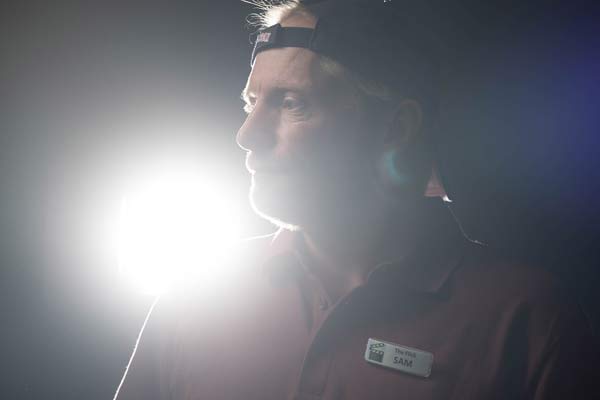Annie Baker’s 'rockstar' play has its Sydney premiere this month, presented by Outhouse Theatre Company.
Pulitzer Prize-winning 'The Flick' blows up the lives of three minimum-wage workers at a failing Massachusetts movie house, home to one of the last working 35mm projectors.
Jeremy Waters, Artistic Director of Outhouse Theatre Company, plays Sam in the mammoth drama. The company decided to get the rights for the play after the strong response Sydney audiences had to another Annie Baker work, 'The Aliens'.
“It felt like Sydney had really discovered a new voice, and the people who like her writing really love it,” Jeremy says. “I’ve never done a play where I come out afterwards and people have been so clearly affected by someone’s playwriting.”
'The Flick' clocks in at three hours in length, and without a single scene or location change, it has been “a lot of work” for the actors to nail the precise rhythms of Annie’s detailed script.
“There’s so much complexity and nuance and depth to it,” Jeremy says. “She lets time play out on the stage in her plays. She doesn’t just give us a two minute glimpse or a little window of a conversation; She will show us the before [and] the aftermath.”
Jeremy’s character, Sam, is a veteran cinema usher who lives in his parents’ attic. He’s not exactly an overachiever, and his prospects of promotion have dimmed over the years.

“He nurses dead dreams and hopes, and like everyone else, sees no real viable path to achieving them,” Jeremy says. “He’s kind of living in a very constant state of a certain frustrated anxiety, which tends to make him a bit of an open wound, in a way. He feels things very intensely.”
Fed up with the struggle to find acting work in New York, Jeremy co-founded Outhouse Theatre Company in 2006, and had his fair share of entry-level jobs in the meantime.
“Way more than I should admit to! Lots of hospo, lots of waitering, restaurants, cater-waitering,” he says. “Lots of sweeping, lots of mopping and then, you know, cafe work? Mundane, menial, banal day-jobs are the cornerstone of everything – I totally relate [to Sam].”
Even though audiences may have left behind their old casual jobs, 'The Flick' quickly brings their memories into sharp focus as it peels back the layers of its three central characters.
“We’re used to seeing super articulate, hyper dramatic gods and monsters,” Jeremy says. “[But Annie] puts three cinema ushers on stage that we wouldn’t really look twice at if they tore our tickets, or came in after the movie finished, and started sweeping up our popcorn.”
The empathy Annie shows for her characters elevates them above their mundane work and offers earnest, yet understated comments on our own changing world.

Avery, a young film tragic, gets his job at the cinema because he wants to work with a 35mm projector, and is devastated by a potential move to digital projection.
“He sees that as a link to something pure that’s going to get lost in this modern digital age,” Jeremy says.
When the quick-fix of streaming allows us to watch anything on our devices, it’s easy to stop seeking out live entertainment like the cinema and the theatre. But Jeremy is hopeful that people will come to value these communal experiences more in the future.
“People will be hungry to sit in dark rooms and dark venues to share in the same space and air as living, breathing, human beings in front of them.”


